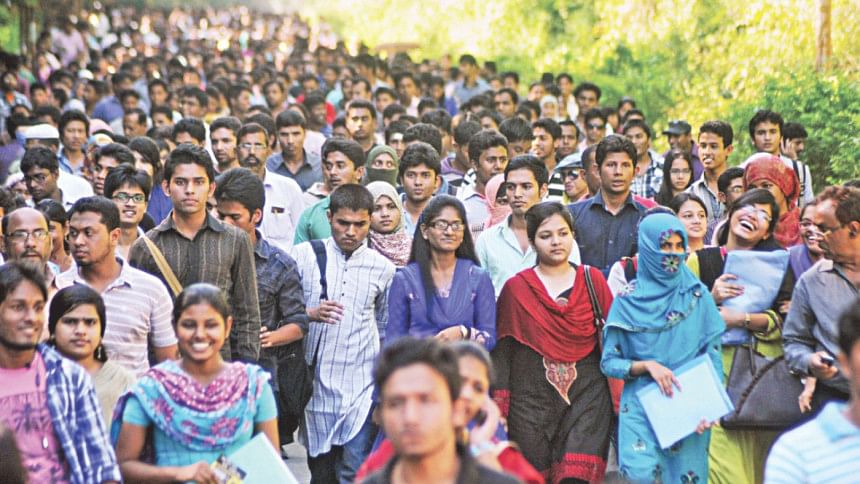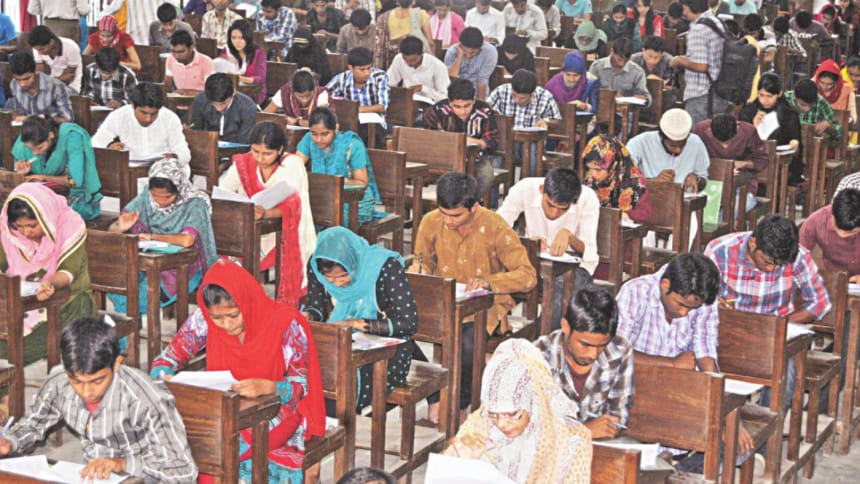Public University Admission Battle

Getting enrolled into a renowned university can be the most difficult yet rewarding experience of your life. Yes, Board Examinations or O-levels/A-levels are definitely important – but university admission tests are more important than anything else as there are lots of stakes involved, most important of which is your undergraduate academic life and consequently, career opportunities.
Getting into public universities can be more frightening than anything else, as you have thousands of qualified candidates from the whole country as your competitors. This is contest on a national level, so you have to be at your absolute best. In this cover story, ideas about different public universities, their admission test patterns and mark distributions are discussed. If you're well-prepared and know what you're dealing with, there's absolutely no reason you can't ace these admission exams.

ENGINEERING UNIVERSITIES
Getting into the major engineering universities of the country may appear to be the toughest public university admission battle to the aspiring candidates. Yes, to some extent it is. Major public engineering universities, i.e. BUET, KUET, CUET, RUET etc. have a very selective approach when it comes to admitting a certain number of students into various disciplines of engineering each year.
Due to the exponential increase in students getting GPA 5 in their HSC examination, there is a primary sorting process based on the score of 20 or 25 including Mathematics, Physics, Chemistry, English and in some cases even Bengali (doesn't make much sense for an aspiring engineering student, though).

After initial assortment, a certain number of eligible candidates (different for each university depending on the number of available seats) are shortlisted for an elaborate written test. Written test basically comprises of theoretical and MCQ questions on Math, Physics, Chemistry and in some cases, English. In some universities, like BUET for example, last year there were 60 theoretical questions (10 each from Math, Physics and Chemistry), carrying 10 marks each, cumulating in total 600 marks that had to be answered over a span of three hours. Theoretical questions imply mathematical problems or application-type problems from various theories learnt throughout the HSC/A-level curriculum.
The trick to do well in engineering admission tests is to have a very clear idea about the whole curriculum, as questions are set from all parts of the textbooks. There are no short-cuts or suggestions like board exams.
In mathematics, problems have to be solved from different textbooks and all the parts (Calculus, Mechanics, Binomial Theorem etc.) have to be given equal emphasis.
For Physics, one needs to have very thorough grasp of all the formulas and know when or how to apply them. Understanding physical interpretations of formulas and practical applications of different mechanisms are of utmost importance.
Chemistry deals with equations. The more you understand the chemical processes and the more you practice writing equations, the easier it'll be for you to do well in the competitive exams.
Never rely too much on coaching centres or guide-books. The textbook is the MOST VALUABLE thing that you've got in your hands.
Understanding everything and being able to solve problems aren't all. It's more about efficiency. The more efficient you are, the faster you are able to interpret problems and solve them, the better your chances. Everyone battling for engineering university admission are competitive and capable – no doubt about that. But it's the individual efficiency that makes the successful candidates stand out.

MEDICAL COLLEGES
Medical college admission test is the biggest admission battle of the country to handpick the aspiring doctors. Every year more than 40,000 students apply for participating in this admission test held at different centres throughout the country. In total, there are around 30 public medical colleges in the country and combined, they have 3,800 seats as of last year. So the extent and scope of competition can be easily comprehended.
The test comprises of 100 multiple choice questions, each carrying one mark. Distribution is as follows:
Biology 30, Chemistry 25, Physics 20, English 15, General Knowledge 10.
Students from science background have to study Physics and Chemistry for engineering university admission test, as well as for science faculties of different universities. But in case of medical admission test, the approach and pattern of preparation for these two subjects vary substantially than other tests.
Medical admission test requires emphasis on the more informative portions of the textbooks. Rather than preparing for conceptual questions, more effort should be given on studying the various information and data provided in the textbooks.

For example, in case of Physics, studying different experiments and their details, units of physical parameters, physical interpretation of different theories and their fields of applications, notable physicists and their works, important dates will come in handy.
In case of Chemistry, understanding different chemical reactions, their mechanisms, reagents and products, and their usage are essential. A thorough knowledge of organic chemistry will prove to be invaluable.
Biology is a subject that most students in their HSC/A-levels don't take much seriously. But for medical admission test, this is the subject that students need to focus on most. In case of Botany, chapters on Cell Biology (Cell, Cell Division, Cell Chemistry etc.) should be given emphasis. In Zoology, a comprehensive understanding of the human body is of utmost importance.
Many students spend quite a lot of time on General Knowledge. But there's no end to it. Assign some particular time daily to studying GK, apart from that – don't over think and panic about it. Don't waste countless hours reading GK books, allot that time and energy to other subjects.
It'll be good to follow a well-prepared guidebook that has got the previous years' questions. Don't rely totally on the answers provided in them, find them out yourselves. Follow one good book for GK; that should be enough.

INSTITUTE OF BUSINESS ADMINISTRATION, DU
The Institution of Business Administration, Dhaka University (or IBA, DU in short) is one of the most prestigious institutions of the country. Each year, from thousands of applicants, only 120 students are taken in. The admission exam is based around the SAT exam of College Board, USA.
The exam has four parts: Maths, English, Analytical and Writing. The first three follow the MCQ format while the Writing section involves the candidates writing essays or arguments. Bangla plays an integral part of this section as well, with translations or short paragraph writing questions. The Maths and English sections both contain 30 marks each. Analytical accounts for 15 marks. It is recommended to spend 1.5 hours on the MCQs and the rest 30 minutes on the Writing section. Passing the admission exam involves passing all four sections. Normally, the passing bar is held at 60 percent for each section; however, this bar might increase or decrease according to the overall performance of all the candidates.
There are various ways of prepping for the exam: first of all, a quintessential book would be Barron's SAT. This contains a plethora of English language questions that match the ones in the admission exam. Not to mention it contains a full word list which can be used to expand your vocabulary.
For Analytical, the GRE Big Book and GMAT Review are recommended.
For maths, Barron's SAT is helpful but the IBA BBA Guide and the Math Q Bank books are good as well.
Once a candidate passes the written exam, he/she gets selected to face the final interview board. The board consists of existing faculties of IBA who will evaluate whether the candidate is suitable for IBA or not.

UNIVERSITIES
Dhaka University, Chittagong University, Rajshahi University, Khulna University, Jahangirnagar University etc. are some of the most renowned public institutions of the country. Getting into one of these universities will provide excellent academic experience.
Following are the exam structure and marks distribution of admission tests for some of the faculties of Dhaka University. Details of each faculty and list of departments can be found here: http://www.du.ac.bd/academics.php#
Faculty of Science, Faculty of Engineering and Technology, Faculty of Pharmacy, Faculty of Biological Sciences
Marks distribution: Candidates have to answer questions on four subjects out of the following six: Physics, Chemistry, Mathematics, Biology, English and Bengali. Answering Biology questions is mandatory for Faculty of Biological Sciences. Thirty questions have to be answered from each of the four subjects, totaling up to 120 MCQs to be filled in an OMR sheet within an hour.
Faculty of Social Sciences (13 Departments Including International Relations, Economics, Public Administration, Political Science, Anthropology Etc.)
Questions have to answered from four broader subjects: Bengali, English, General Knowledge (Bangladesh) and General Knowledge (International). Twenty-five questions have to be answered from each of the four subjects (1.2 marks per answer) – carrying a total of 120 marks. For every wrong answer, 0.3 marks is penalised. Minimum 8 marks have to be obtained in each of the subjects to pass. Duration of the exam is one hour.
Faculty of Business Studies
There are eight departments and the faculty provides BBA and MBA degrees in Marketing, Finance, Accounting and Information Systems, International Business etc.
Written Exam is held on four subjects: English, Bengali, Accounting and Management. Out of a total 120, each subject carries 30 marks. Passing English is compulsory. Pass marks in English is 12 out of 30. Duration of the exam is one hour.
Preparation should be started just after the completion of HSC/A-level exams. Emphasis should be given on textbooks. Help of coaching centres can be useful to practice efficiently and to give mock/model tests. Mocks help to get used to the real exam scenario and increase confidence. Solving questions of previous years is essential.
Well, that's all. Best of luck!
[Special thanks to Dr. Toufiq Hasan Protik (M.B.B.S.); Kamrul Hossain Shuvo (B.Sc.), Economics, DU; and Syed Rakib Zaman (BBA), Finance, DU]

 For all latest news, follow The Daily Star's Google News channel.
For all latest news, follow The Daily Star's Google News channel. 



Comments